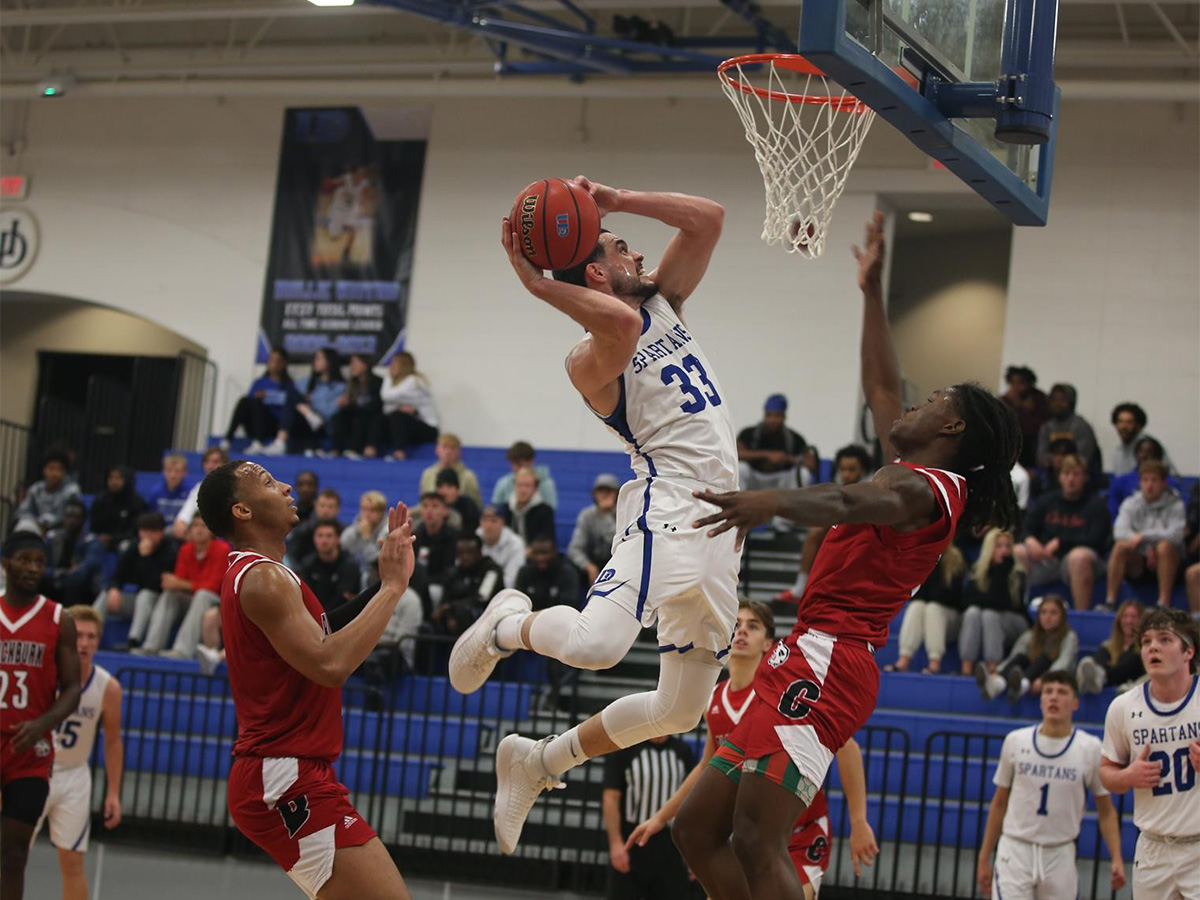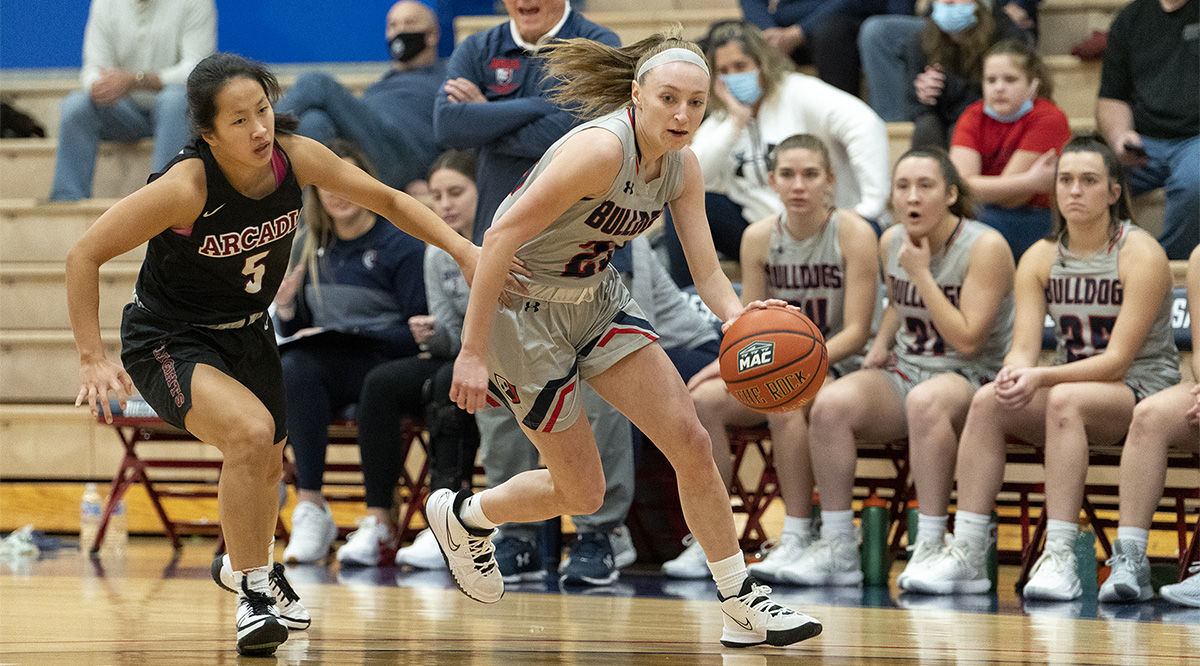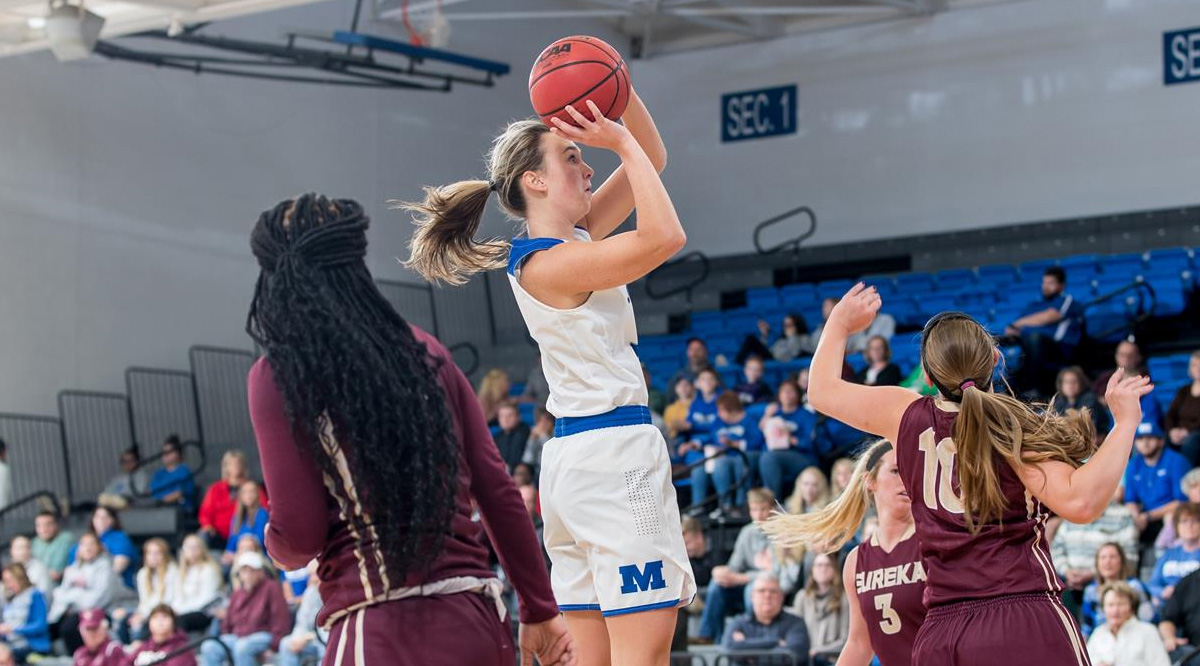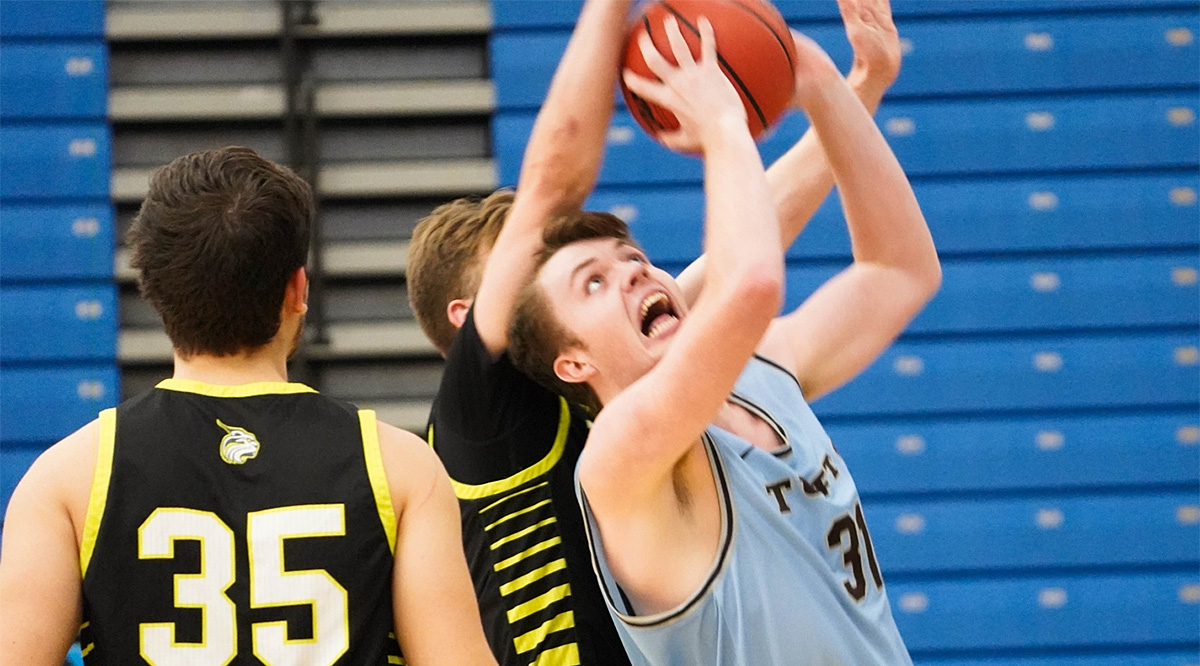
|
| Dubuque athletics photo |
By Ryan Scott
D3hoops.com
“It doesn’t matter how experienced a team or how tenured a coach, last year was a difficult buy-in.”
Perhaps an understatement from DeSales head women’s basketball coach, Fred Richter, but true nonetheless. The Bulldogs were a Top 10 team in the D3hoops.com women’s poll this year, but quickly fell out with losses to Muhlenberg, No. 18 Messiah, and No. 19 Scranton.
Close losses to good teams early in the season don’t spell disaster, of course, but they do provide a clear picture of where teams need to improve. “With COVID,” says Richter, “we had only conference games and the way the schedule worked out, we didn’t even get to play some of the tougher teams in our conference. We won too easily and our freshmen didn’t understand what it would take to win against the best teams.”
With 30-plus years of experience at DeSales, Richter understands the importance of culture and passing those traditions and expectations down to new players. “We weren’t able to do things the way we normally do them during COVID,” notes Richter. “My captains came to me this year and said, ‘We need to go back and reteach and relearn some things.’ ”

|
| Maria Newsome is in her third season as a starter at DeSales. DeSales athletics photo by Stephanie Graffin |
Coaches regularly attempt to overstate how important the little things are to winning, but it’s really impossible to do. Without constant repetition, even the most basic principles can slip just enough to lose games your team should be winning.
Richter’s philosophy at DeSales bears results. The methodical, nose-to-the-grindstone culture has been remarkably consistent. While they’ve not yet broken through to a Final Four, deep playoff runs characterize a program that wins 20 games almost every year and hasn’t had a losing season since 1992.
Says Richter: “We keep it simple. We don’t take days off. We don’t wear costumes on Halloween. We try to get better every day and everyone in the program understands that’s the expectation.”
It’s this kind of consistent success that Olivia Lett and her team are working to rebuild at Millikin. They had great success during the pandemic year, winning the CCIW behind super freshman Elyce Knudsen and a host of experienced upperclass players, all of whom return this year. Like DeSales, the Big Blue took some losses early and are working to learn and improve as the conference schedule begins.

|
| Bailey Coffman provides a solid second scoring threat for the Millikin women's basketball team, and Jordan Hildebrand provides a third. Millikin athletics photo |
“The program isn’t where we want it to be yet,” says Lett, who won a national championship as a player at Illinois Wesleyan. “We still have a lot to prove, but our players didn’t really understand that until this year.”
The week before Thanksgiving, Millikin went on the road to No. 10 DePauw and then to Chicago, to play the host school and also a very strong Wisconsin Lutheran squad. Three big tests in one, resulting in three early losses.
“We haven’t played a lot of Top 25 teams,” says Lett. “DePauw is a great team and a great program and they did some things we don’t normally see and we weren’t prepared. In Year 1, if you can compete in these games, you’re really excited, but now in Year 3, to really establish this program where we want to be, we can’t be satisfied dropping games here and there.”
One of the elements of a great team is developing multiple avenues of attack. Lett concedes that her team relies too much on Knudsen to make the offense work and their next phase of growth and development is involving the other capable players and pushing Knudsen to do more off the ball.
Another squad learning the same lesson the hard way is Tufts, whose All-American big man, Luke Rogers went down to injury just 15 minutes into their opener. New head coach Brandon Linton has seen his team struggle to a 2-6 start as they work out how to adapt.
“It rattled us for a little bit there,” says Linton, who took over the program from long-time coach Bob Sheldon this summer. “It forced guys to expand their games and to come to grips with who we are, especially who we are without Luke. We’ve had to admit how much we relied on him on both ends of the floor, but it’s also allowing guys to step into new roles.”
Freshmen Bobby Stewart and Trumann Gettings are playing almost all the minutes at the post early on, banking loads of in-game experience they might not otherwise have received, which will only pay dividends in the future.
Rogers is expected back by January, if not sooner, and he’ll be returning to a team that’s more confident and capable, despite the losses. “Luke’s been our biggest cheerleader on the sidelines,” says Linton, whose teams faced an early schedule befitting their No. 11 preseason ranking.
UMass-Dartmouth and Brandeis are receiving Top 25 votes and St. Joe’s is No. 5 in the country right now. Difficult opponents for a team reconfiguring itself midstream, but with a dominating win over Salem State last weekend, followed by a tough, but competitive 5OT loss to Brandeis the next day, things seem to be looking up.

|
| Bobby Stewart is one of two freshmen getting a lot of playing time with preseason All-America selection Luke Rogers hurt. Tufts athletics photo |
This Saturday’s matchup with Linton’s former school, Nichols, should be a great barometer of where things stand heading into the holiday break. “I’d been trying to schedule a rematch with Tufts while I was at Nichols and we just couldn’t make it work, so that was a no-brainer when I got here. This game will be a little easier in terms of prep, but it’s not any better in terms of quality of opponent.”
With six losses already, and a NESCAC schedule to come, it’s unlikely Tufts will be in the hunt for a Pool C bid at the end of the year. At this point the focus becomes getting better each day, and preparing for the gauntlet of conference play that will determine their ability to make waves in the postseason.
It’s the same position Dubuque finds itself in. Undefeated during the COVID year, the Spartans find themselves sitting on three losses already, largely because the shots aren’t falling like they used to. “Listen,” says coach Robbie Sieverding, “I did not expect us to hit 45% of our threes like we did last season, but I thought we’d be better than 28%.”
That percentage has crept up to 30% since we spoke, but the point remains, things just haven’t fallen into place as well as they did a year ago. “We’ve got guys who haven’t lost a game in 500 days or more,” says Sieverding. “I’m not sure our guys really understood what it would mean to get everybody’s best shot every night.”
The preseason No. 16 ranking has certainly been a target on their backs, but Dubuque is also figuring out how to fill in the hole left by Pat Mayfield, who transferred to Akron over the summer. The 6-5 guard provided a physical inside-outside game that can’t be replaced by just one player.
“Last year was the first with our five-out offense,” says Sieverding. “A lot of it depends on how defenses are guarding you, so there’s not a lot of adjusting what we do [without Pat].”
They’re also dealing with an improved conference. Six or seven teams in the ARC have a legitimate shot to win the conference – it’s not just a scenario where any team can win on any given night, most of them can beat you even at your best.
Notes Sieverding: “We’re going to have to grind it out and play better defense. Our expectation is to win every game we’re playing and we have a team more than capable of doing it. We’re excited to compete this year and we believe we have a team that can win the conference, the conference tournament, get to the NCAAs and advance. That’s what we’re working towards.”
Only about 6% of Division III teams can be in the Top 25, and just under 15% can be in the NCAA Tournament. Yet, 100% of the teams are working towards that goal. Most have a legitimate chance to at least win their conference and get an automatic bid, if they work hard and things break their way. The four stories highlighted here represent dozens of others in similar or unique situations.
It’s easy to watch hundreds of scores scroll by on a website or see a win-loss record and forget the everyday realities behind each and every one of those numbers. They represent players, coaches, families, teams – who put in thousands of hours of work with the hope and expectation that the ball will bounce their way in the right number of games to do something special.
The ones who succeed are the ones who understand how important it is to have a foundation on which to build. That’s the real story of November and December: whether there are wins or losses, it’s about the little victories and incremental improvements that help each team be a little better after practice than they were when it began.
